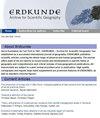Theory and practice of conservancies: evidence from wildlife management areas in Tanzania
IF 1.1
4区 社会学
Q3 GEOGRAPHY
引用次数: 4
Abstract
The integrity of Protected Areas depends on the surrounding communities and their land as they provide crucial ecological functions as wildlife corridors. Hence, the paper analyses the performance of Tanzanian Wildlife Management Areas (WMAs) to better understand their relevance for safeguarding biodiversity outside of traditional protected areas, e.g. national parks. The article assesses the potential of WMAs, which have complex social and ecological processes and interactions, to achieve their environmental and socio-economic goals from a governance perspective. Therefore, a combination of two theoretical approaches – the Social-Ecological Systems Framework (SESF) and the Sustainable Livelihoods Approach (SLA) – was employed to provide a thorough and methodical evaluation of their system dynamics. This research mainly presents data gathered in 2017 in eight fully authorised WMAs of different ages, and which represent a tourist activity gradient from no nature-based to well-developed. Qualitative empirical research included focus group discussions, field observations and semi-structured interviews with key persons and representatives of different organisations. These include local managers and members of WMAs, regional District Councils officials from the areas where the WMAs have been established, and international stakeholders. The study shows that local governance of wildlife resources in most WMAs is still plagued by understaffing, inadequate funding, insufficient skills and knowledge, and investment issues. As a result, it takes time for the tourist industry to find confidence in the WMA concept, but recent figures show that WMA related tourism facilities which are increasingly sponsored by private investors, show higher revenues. Therefore, for WMAs to be sustainable, it is imperative to address the concerns mentioned above. Community-based conservation is part of development and the improvement of the overall wellbeing of people. However, in practice, everything is still only valued in terms of direct cash benefits. Where the analysed WMAs are failing it is mostly because unsustainable revenue sources cannot provide in their daily operational needs or adequately fund community development projects. Hence, because conservation is expensive, the key to the long-term sustainability of WMAs remains impeccable governance and financial stability.保护区的理论和实践:来自坦桑尼亚野生动物管理区的证据
保护区的完整性取决于周围社区及其土地,因为它们作为野生动物走廊提供了重要的生态功能。因此,本文分析了坦桑尼亚野生动物管理区(wma)的表现,以便更好地了解它们在保护传统保护区(如国家公园)以外的生物多样性方面的相关性。本文从治理的角度评估了具有复杂的社会和生态过程和相互作用的wma实现其环境和社会经济目标的潜力。因此,结合两种理论方法——社会生态系统框架(SESF)和可持续生计方法(SLA)——对其系统动力学进行了全面和系统的评估。本研究主要展示了2017年在8个完全授权的不同年龄的wma中收集的数据,这些数据代表了从不以自然为基础到发达的旅游活动梯度。定性实证研究包括焦点小组讨论、实地观察和与主要人士和不同组织代表的半结构化访谈。这些人包括wma的当地管理人员和成员,来自已建立wma地区的区域区议会官员,以及国际利益相关者。研究表明,在大多数野生动物保护区,野生动物资源的地方治理仍然存在人员不足、资金不足、技能和知识不足以及投资问题。因此,旅游业需要一段时间才能找到对WMA概念的信心,但最近的数据显示,越来越多的私人投资者赞助的WMA相关旅游设施显示出更高的收入。因此,要使wma可持续发展,必须解决上述问题。以社区为基础的保护是发展和改善人民整体福祉的一部分。然而,在实践中,一切仍然只以直接的现金收益来衡量。所分析的wma之所以失败,主要是因为不可持续的收入来源无法满足其日常运营需求或为社区发展项目提供充足资金。因此,由于保护是昂贵的,wma长期可持续性的关键仍然是无懈可击的治理和财务稳定。
本文章由计算机程序翻译,如有差异,请以英文原文为准。
求助全文
约1分钟内获得全文
求助全文
来源期刊

Erdkunde
地学-自然地理
CiteScore
2.00
自引率
7.10%
发文量
17
审稿时长
>12 weeks
期刊介绍:
Since foundation by Carl Troll in 1947, ''ERDKUNDE – Archive for Scientific Geography'' has established as a successful international journal of geography. ERDKUNDE publishes scientific articles covering the whole range of physical and human geography. The journal offers state of the art reports on recent trends and developments in specific fields of geography and comprehensive and critical reviews of new geographical publications. All manuscripts are subject to a peer-review procedure prior to publication. High quality cartography and regular large sized supplements are prominent features of ERDKUNDE, as well as standard coloured figures.
 求助内容:
求助内容: 应助结果提醒方式:
应助结果提醒方式:


